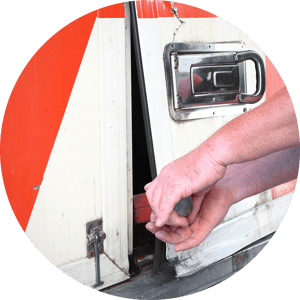Preventing Cargo Theft During the Holidays

Security Tips for Motor Carriers
- Require all personnel who have access to cargo areas, including vendors, contractors, maintenance, and clerical workers, to provide a detailed application that includes a photograph and lists residences and prior employment for the past 10 years, if applicable.
- Screen all applications to verify address and prior employment.
- Have applicants list all vehicles used for work; information should include license numbers and descriptions.
- Maintain a random drug testing program, including "probable cause" testing.
- Limit the number of employees who have access to shipping information.
- Set up a reporting procedure that includes a substantial reward plan so company drivers and other employees can and will provide information about possible criminal activity.
- Implement a “no stop” policy for drivers picking up containers for local delivery.
- Prepare a driver handbook listing the rules so drivers can be held accountable. For example, rules should cover policies on stopping en route and parking loads in unsecured areas. As part of the hiring procedure, inform drivers that they will be terminated if they violate these policies.
- Make sure each driver has a 24-hour phone number for management personnel that he or she can call in the event of an emergency.
- Use padlocks on all pickup and delivery units, and require drivers to lock all doors when they are away from their units.
- Either provide your own guards or hire a reputable guard service. Question the service about its hiring practices. Insist that it conduct the same background checks on its guards that you do on your drivers.
- Spot check the guards on an irregular basis to make sure they’re fulfilling the responsibilities of the position.
- Place the guards in an inaccessible area where they can monitor activities at your facility yet be secure and safe from assault. Make sure they know whom to notify in the event of a problem.
- Conduct a physical security audit of your facility. Are you using lighting, fencing, and closed-circuit television to the best possible advantage?
- Limit yard access after normal business hours.
- Set up specific procedures concerning the type of documentation required before a driver is allowed to leave the yard. Hold guards accountable for obtaining this documentation.
- Conduct lunch box inspections.

- Make sure you have complete records of all the equipment in your yard overnight, especially license plate numbers, containers and trailer numbers.
- Install high-quality pin locks on trailers or containers that are left in your yard overnight.
- Install time-lapse surveillance cameras in your yard; install them so they clearly identify a driver and tractor-trailer leaving the yard.
- Consider installing fuel cut-off valves, tracking systems, and other security devices on your equipment. Heavy-duty padlocks should be mandatory on all trailer and container doors.
- Paint tractor or trailer numbers on roofs so they are visible from the air.
- Do not leave loaded trailers or containers in your yard overnight.
- Do not accept late deliveries that you can’t offload that day.
- Frequently check your yard at different hours.
- Get to know the police officers who work in your area. Make it a point to acquaint them with your operational procedures.
Security Tips for Drivers
- Always lock tractor doors and secure all trailer and container doors with a heavy-duty padlock.
- Keep tractor windows rolled up until you are on the open road.
- Always carry information on your person concerning the identification of the tractors, trailers, chassis, or containers you are pulling. These details include license numbers, container numbers, and physical characteristics. Law enforcement can’t act on a cargo theft without this information.
- Maintain regular communication with your dispatcher, and let him or her know of anything suspicious or odd.
- Do not discuss your load on the radio, over the phone, or in public – cargo thieves listen, too.
- When possible, vary your delivery route.
- When possible, go directly to your delivery point without making any stops.
- When you need a rest stop, park in areas where other truck drivers are present. Hijackers don’t like crowds.
- Stop only at reputable truck stops along your route – and don’t stop at the same location every time.
- Don't stop on dark freeways or in deserted areas while waiting to make deliveries.
- Never take your load home, and don’t park it in an unsecured area.
- When possible, drive in tandem with another truck – it cuts down the risk of being hijacked.
- Be aware of vehicles following your truck and of strangers asking questions about what you are carrying.
- Be suspicious of individuals asking you to stop as a result of an alleged traffic accident. Hijackers frequently use this ruse to get drivers to stop. If you are unsure whether an accident occurred, drive to a police station or well-lit, busy intersection before stopping.
- Be especially watchful immediately after picking up your load. The majority of hijackings occur within a few miles of the pickup point. Freeway on- and off-ramps are particularly dangerous.
- If you are hijacked, or if your load is stolen, immediately notify the local police by dialing 911. Then call your 24-hour dispatcher.
- If you are hijacked, always do as instructed by the hijackers, but listen to what is being said and the sounds around you. It may provide law enforcement valuable information about where the thieves have taken your vehicle and load.
- Try to provide a description of the hijackers and the vehicles they used. You are law enforcement’s best witness.
Note: These lists are not intended to be all-inclusive.
The information in this article is provided as a courtesy of Great West Casualty Company and is part of the Value-Driven® Company program. Value-Driven Company was created to help educate and inform insureds so they can make better decisions, build a culture that values safety, and manage risk more effectively. To see what additional resources Great West Casualty Company can provide for its insureds, please contact your safety representative, or click below to find an agent.
© Great West Casualty Company 2020. The material in this publication is the property of Great West Casualty Company unless otherwise noted and may not be reproduced without its written consent by any person other than a current insured of Great West Casualty Company for business purposes. Insured should attribute use as follows: “© Great West Casualty Company 2020. Used with permission by Great West Casualty Company.”
This material is intended to be a broad overview of the subject matter and is provided for informational purposes only. Great West Casualty Company does not provide legal advice to its insureds, nor does it advise insureds on employment-related issues. Therefore, the subject matter is not intended to serve as legal or employment advice for any issue(s) that may arise in the operations of its insureds. Legal advice should always be sought from the insured’s legal counsel. Great West Casualty Company shall have neither liability nor responsibility to any person or entity with respect to any loss, action, or inaction alleged to be caused directly or indirectly as a result of the information contained herein.




